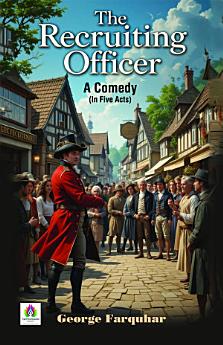The Recruiting Officer, A Comedy (In Five Acts)
About this ebook
The plot centers around Captain Plume, a charming and roguish officer tasked with recruiting soldiers for the army. Despite his military obligations, Plume is more interested in winning the hearts of the local women than in filling the ranks. His charming demeanor and flirty nature draw the attention of several women, particularly the spirited and witty Sylvia, who is not easily swayed by his advances. Throughout the play, Farquhar masterfully intertwines themes of love and manipulation, revealing how characters navigate their desires amidst the chaos of conflict.
The dynamic between characters is at the forefront of the play, as Captain Plume's interactions with various figures, including his fellow officer, his rival, and the town's reluctant citizens, reflect the complexities of military life and societal expectations. Observations about honor, masculinity, and the foolishness of pride are sprinkled throughout the dialogue, creating a rich tapestry of humor and insight. The characters are vividly depicted, from the arrogant and pompous rival to the intelligent and resourceful women who challenge their male counterparts, making the play a vibrant exploration of gender roles in a transforming society.
As the plot unfolds, the comedic misunderstandings and romantic entanglements lead to uproarious situations, showcasing Farquhar's talent for physical humor and clever wordplay. Each act builds upon the last, leading audiences through a series of escalating antics and mischief that culminate in a satisfying and hilarious resolution. The joy of The Recruiting Officer lies not only in its humor but also in its ability to speak to universal human themes—love, loyalty, and the sometimes foolish nature of ambition.
Farquhar's adeptness at character-driven storytelling allows the audience to engage deeply with the players on stage. The enduring popularity of The Recruiting Officer can be attributed to its ability to entertain while simultaneously inviting reflection on the folly of human behavior in pursuit of love and ambition. The clever dialogue and dynamic relationships tenderly poke fun at the societal norms of the time, making the play a mirror reflecting the era's conventions while remaining relevant to modern audiences.
This comedic masterpiece emphasizes the notion that love can be as strategic and intricate as military recruitment itself, with its fair share of cons and conscriptions. Farquhar's work consistently invites laughter while revealing truths about the human condition, establishing him as one of the prominent voices in Restoration comedy. Ultimately, The Recruiting Officer is not merely a lighthearted farce but a cleverly devised commentary on the intricacies of human relationships and societal expectations, leaving indelible impressions on both its characters and the audience alike.




